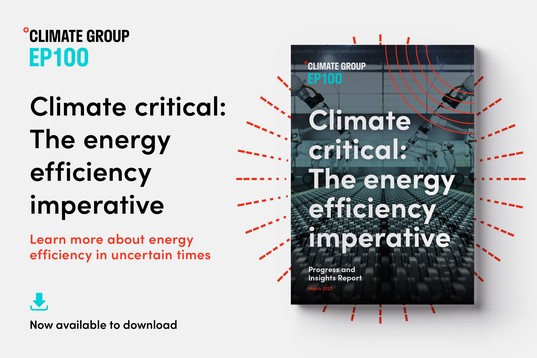- Businesses and governments can’t continue wasting energy and must wake up to the power of energy efficiency, says new report.
- To date, EP100 members have reduced more emissions than the combined annual emissions of Denmark, Italy and Portugal, saving $1.2 USD billion.
- One EP100 member is increasing resilience and mitigating some of the effects of ‘loadshedding’ in South Africa through energy efficiency improvements.
The global energy crisis is a wakeup call to businesses and governments, making it clear we can’t go on wasting energy. This is according to the latest Progress and Insights Report from Climate Group’s EP100 initiative, published today.
Being energy efficient can save the private sector billions of dollars, and bring down emissions. Just EP100 members have reported $1.2 billion saved so far, while at the same time reducing emissions by 380 million metric tonnes of CO2e. That’s equivalent to the yearly electricity use of 7.6 million homes, Climate Group said.
Climate critical: The energy efficiency imperative shares how 125 ambitious EP100 members, in 126 markets, are improving energy resilience and cutting costs through energy efficiency. In the report Toby Morgan, Senior Manager, Built Environment, Climate Group, urges more companies and governments to act: “If not now, when?”
The report details how members are reaping the rewards of climate critical energy efficiency improvements. To date, members have reduced more emissions than the current combined annual emissions of Denmark, Italy and Portugal. The report emphasises the vital importance of energy efficiency for taking on volatility in the energy market and slashing fossil fuel demand.
“The enormous potential of energy efficiency has been brought into sharp focus by the war in Ukraine and the global energy crisis. We’ve been a fierce advocate for energy efficiency for years and we’re glad some of the world’s most powerful politicians and corporates have now woken up to the power of these improvements. More policymakers and companies must invest and implement energy efficiency measures, without which, the journey to net zero will be significantly harder.”
“The enormous potential of energy efficiency has been brought into sharp focus by the war in Ukraine and the global energy crisis. We’ve been a fierce advocate for energy efficiency for years and we’re glad some of the world’s most powerful politicians and corporates have now woken up to the power of these improvements. More policymakers and companies must invest and implement energy efficiency measures, without which, the journey to net zero will be significantly harder.”
Through measures, such as fitting more efficient air conditioners, building facilities which retain their heat better and installing more efficient manufacturing machinery, EP100 members are taking on the energy crisis and making the most of every unit of energy they consume. The report also shares how, in 2022, three EP100 members – Danfoss, JSW Cement, and Mahindra Heavy Engines Ltd – reported hitting their stated energy efficiency targets. They reported doubling their energy productivity – their ratio of economic output to energy consumption.
“We can’t go on wasting energy, there’s never been a better time for corporates and governments to invest in energy efficiency. Now more than ever, all companies must play a role in the transition to net zero, and energy efficiency improvements can be an important first step, making businesses more competitive, and protecting themselves against future volatility,” said Toby Morgan, Senior Manager, Built Environment, Climate Group.
Energy efficiency has proven particularly valuable to EP100 member Woolworths Holdings. Based in South Africa, Woolworths fits its new stores with energy efficient technologies, such as automated LED lighting, and for its older stores it has a retrofitting programme. ‘Loadshedding’, the shutdown of the power supply when the grid can’t meet the demand, is an ongoing issue in South Africa. Through its energy efficiency measures, Woolworths is less reliant on diesel and more resilient during these outages.
“Sustainability has always been one of Woolworths’ core values and starting to invest early in energy efficiency technologies and employee training has significantly contributed to our reduction in carbon emissions. And because we started early, most of the investment has already paid for itself,” said Feroz Koor, Group Head of Sustainability, Woolworths Holdings (EP100 member).
